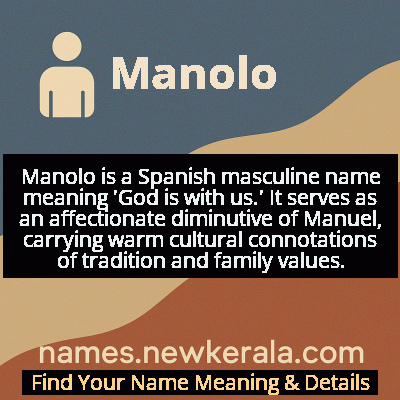Manolo Name Meaning & Details
Origin, Popularity, Numerology Analysis & Name Meaning of Manolo
Discover the origin, meaning, and cultural significance of the name MANOLO. Delve into its historical roots and explore the lasting impact it has had on communities and traditions.
Name
Manolo
Gender
Male
Origin
Spanish
Lucky Number
7
Meaning of the Name - Manolo
Manolo is a Spanish masculine name meaning 'God is with us.' It serves as an affectionate diminutive of Manuel, carrying warm cultural connotations of tradition and family values.
Manolo - Complete Numerology Analysis
Your Numerology Number
Based on Pythagorean Numerology System
Ruling Planet
Neptune (Ketu)
Positive Nature
Intuitive, analytical, spiritual, and inquisitive.
Negative Traits
Secretive, reserved, aloof, and can be overly critical.
Lucky Colours
Green, yellow.
Lucky Days
Monday.
Lucky Stones
Cat’s eye, moonstone.
Harmony Numbers
1, 5, 6.
Best Suited Professions
Scientists, researchers, spiritual leaders, detectives.
What People Like About You
Depth of knowledge, analytical skills, spirituality.
Famous People Named Manolo
Manolo Blahnik
Fashion Designer
Revolutionized luxury footwear and became one of the most influential shoe designers in fashion history
Manolo Santana
Tennis Player
First Spanish man to win Wimbledon and multiple Grand Slam titles, pioneering Spanish tennis success
Manolo Escobar
Singer
Sold over 80 million records and became one of Spain's most beloved folk and copla singers
Manolo Gabbiadini
Footballer
Successful Serie A and Premier League career with notable performances for Italian national team
Name Variations & International Equivalents
Click on blue names to explore their detailed meanings. Gray names with will be available soon.
Cultural & Historical Significance
Extended Personality Analysis
People named Manolo are typically characterized by their warm, outgoing personalities and strong sense of tradition. They often possess a natural charm and social grace that makes them popular in their communities, combined with a deep loyalty to family and friends. Manolos tend to be passionate individuals who approach life with enthusiasm and emotional intensity, whether in personal relationships, professional pursuits, or creative endeavors. Their traditional values often manifest as reliability and steadfastness, making them dependable partners and friends. At the same time, many Manolos display artistic sensibilities and appreciation for beauty, whether expressed through fashion, music, gastronomy, or other creative outlets. They typically balance this artistic side with practical wisdom and grounded decision-making. The combination of passionate nature and traditional values often results in individuals who are both emotionally expressive and morally principled, capable of deep commitments and lasting relationships. Their personality often reflects the Spanish cultural ideals of honor, family loyalty, and joyful engagement with life.
Modern Usage & Popularity
In contemporary naming practices, Manolo maintains a stable presence in Spanish-speaking countries while gaining some international recognition through cultural exports. The name experienced its peak popularity in Spain during the 1950s-1970s but has seen a moderate revival in recent years as parents seek traditional names with authentic cultural roots. Modern usage often treats Manolo as a standalone given name rather than exclusively as a nickname for Manuel, reflecting a trend toward more casual, approachable names. The name's association with fashion icon Manolo Blahnik has given it cachet in international circles, particularly in fashion and design communities. In Latin America, the name remains popular, especially in countries with strong Spanish cultural ties like Mexico, Argentina, and Colombia. Current usage trends show the name being chosen by parents who value traditional Spanish heritage while appreciating the name's friendly, accessible quality. The name continues to be particularly strong in southern Spain and among Spanish diaspora communities worldwide.
Symbolic & Spiritual Meanings
Symbolically, Manolo represents the embodiment of divine presence in human relationships and everyday life. The name carries the profound meaning 'God is with us,' symbolizing protection, guidance, and spiritual companionship in the journey of life. In cultural terms, it symbolizes authentic Spanish identity, craftsmanship, and the passionate engagement with life that characterizes Mediterranean cultures. The name evokes the skilled artisan – whether the shoemaker, the guitarist, or the chef – representing dedication to quality and beauty in one's work. Manolo also symbolizes family continuity and tradition, often being passed through generations as a tribute to ancestors. Metaphorically, the name represents the bridge between sacred and secular, tradition and innovation, family loyalty and individual expression. It embodies the Spanish cultural concept of 'alegría' – that particular joy found in community, celebration, and authentic emotional expression. The name suggests someone who finds the sacred in the ordinary and brings beauty and meaning to everyday experiences.

